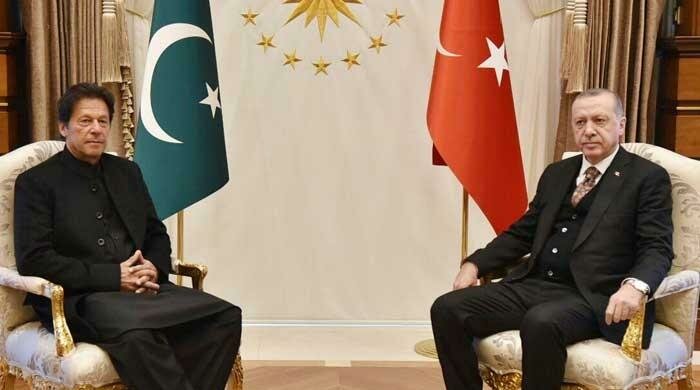Turkey, Pakistan upgrade strategic partnership

Adding a fresh chapter to their historic relations, Turkey and Pakistan recently upgraded their military and strategic relationship. Ever since Pakistani Prime Minister Imran Khan’s visit to Ankara early this year, the two countries’ defense relations have been getting stronger and are now on a decidedly upward trajectory.
Proactively dealing with the shifting security dynamics in South Asia and the Middle East, the brotherly countries ramped up joint counter-terrorism exercises and drills with Uzbekistan in the last week of April.
Simulating terrorist infiltration, the Partnership Shield 2019 military drills focused on coping with proxy warfare. Held in eastern Uzbekistan this time around, the next phase of these tri-country drills will take place in Turkey. Describing the Ankara -Islamabad equation, Turkish Air Force Chief General Hasan Kucukakyuz stressed that “Turkey will always stand by Pakistan through thick and thin,” while addressing officers at the Risalpur air force base in Pakistan last month.
Having had regular military training exchange programs since 2000, Turkey and Pakistan established a high-level military dialogue mechanism in 2003. Over the years, both countries found each other to be reliable defense partners and bilateral military mechanisms were further synchronized.
Nevertheless, the strategic ties we see today are unprecedented and further consolidation of interests can be expected in the future.
Amid a worsening geopolitical scenario, Ankara and Islamabad plan to stick it out together. While Turkey’s neighborhood has been destabilized by the Syrian civil war and Arab-world tensions with Iran and Qatar, Pakistan faces a terror threat due to enduring instability in Afghanistan. To make matters worse, uncertainty has clouded US relations with both Turkey and Pakistan over the past year. Istanbul diverges with Washington over the situation in Syria, while Pakistan-US ties have fluctuated constantly over the civil war in Afghanistan.
Facing constraints in updating the F-16s provided by the US for its air force, Pakistan asked Turkey for help and it has now become Pakistan’s second-biggest arms supplier after China. Up until now, the most important defense deal between Islamabad and Ankara has been the procurement of four MILGEM Ada Corvettes for the Pakistani navy, while the largest ever defense contract has been the sale of 30 Turkish T129 ATAK helicopters to Pakistan for $1.5 billion. At the same time, Turkey also purchased training planes from Pakistan recently.
While Turkey’s neighborhood has been destabilized by the Syrian civil war and Arab-world tensions with Iran and Qatar, Pakistan faces a terror threat due to enduring instability in Afghanistan
From being Islamabad’s only supporter when Pakistan was being put on the “grey list” by the Financial Action Task Force (FATF) last year, to being one of the main and most regular participants in Pakistan’s International Defense Exhibition and Seminar (IDEAS), Ankara remains Islamabad’s most dependable ally.
Meanwhile, strategic partner Islamabad also helps Ankara bridge the divide between East and West. Over the years, ambiguous neutrality has been the linchpin of Ankara’s foreign policy, and extending military ties with Pakistan will increase Turkey’s leverage towards the East and facilitate more interaction in South Asia. Diversifying options is a better long-term policy for both countries and this can be achieved with mutual cooperation.
In the near future, the Istanbul Tripartite Summit (Turkey, Pakistan, and Afghanistan) is to be held and Ankara will be playing an important role in resolving the Afghanistan conundrum. Being a part of both “worlds,” the East and the West, offers multiple benefits, and both Islamabad and Ankara help each other bridge this divide.
Along with strategic ties, more economic interaction has also been planned and a Strategic Economic Framework (SEF) is being mulled over. Pakistan requires direct foreign investment while Turkey is interested in construction projects and Prime Minister Khan is planning to build five million houses for the poor in the next five years.
Projected to increase the trade volume by at least five times, the SEF is expected to be operational soon while negotiations are in progress towards the inking of a free trade agreement. In tandem, a direct Istanbul-Tehran-Islamabad trade corridor was initiated in Pakistan under the TIR system in April 2018. Once fully operational, this fast-track route would link up Iran, Central Asia, Turkey, and Europe, and the trade possibilities are endless.
Sharing a history dating back to Turkish-origin Mughal emperors ruling the Indian subcontinent, both countries are intricately interlinked. Considering that even Pakistan’s national language Urdu has linguistic roots in the Turkish language, it is a precious relationship. Both nations share an emotional bond and one of the best examples of this friendship is that many landmarks in Pakistani cities are named after the Turkish leader Kemal Ataturk, while one of the main avenues in Ankara is named after Pakistan’s founder, Muhammad Ali Jinnah – “Cinnah Cadesi.”
